We have been thrilled to get to send out books from the last several BookNotes lists — three cheers for those doing some serious summer reading and who have sent their order to us. Thanks for supporting our work here. We’re glad to be of help.
I hope you didn’t miss the one a few weeks back that described the remarkable Charles Marsh memoir, Evangelical Anxiety or the one that followed that on psychology and mental health. Then, I reviewed a recent fav, Bill McKibben’s The Flag, the Cross, and the Station Wagon. Many said they liked the BookNotes post describing some compelling nonfiction studies, history, underdog sports stories, immersive journalism and that kind of narrative writing. Or last week’s post about patriotism, featuring the new Richard Mouw book, How to Be a Christian Patriot (always a good reason for Hearts & Minds to celebrate.) As we sometimes do, I suggest a handful of other similar titles or good ones to read together, with pretty different viewpoints, like when I listed Os Guinness and Jim Belcher next to Diana Butler Bass and David Dark, or Reformed Rich Mouw and Anabaptist Jonny Rashid. It was a good list, I think. Thanks for letting us help you read widely, friends!
After this string of BookNotes highlighting powerful reads on social concerns and public theology and the like, I thought I’d name some recent ones in the genre of “basic Christian growth.” We’ve never had a “Christian living” section in our bookstore [as many Christian bookstores do] since, well, what isn’t Christian living for a follower of Jesus? That always drove me crazy seeing such a dumb category in many Christian bookstores, or publishers saying to stock this book “in your Christian living section.” Like your art and politics and ecology and sexuality and technology sections aren’t “Christian”?
Yet, what does one call books that are not about the inner life of contemplative spirituality, say, or theology, proper, or Biblical studies? For complicated reasons I’m not fond of the phrase “applied theology” (although I use it sometimes) and the word “discipleship” (as in Bonhoeffer’s significant Cost of Discipleship) suggests to some the process of disciple-making (evangelism and faith mentoring of new believers.) So we sometimes use the phrase basic [not meaning simple, but foundational] Christian growth, even though I’m not sold on the phrase. These sorts of books guide us in foundational habits and practices and help cultivate insights and passions for wisely growing one’s faith or deepening one’s core convictions about trusting God and how to live for His Kingdom. Again, a book about work or grief or racial justice is part of basic living for God, so my semantics are driving me crazy. I hope it annoys you, too. As we often say, after all, we believe in “all of life redeemed” and Christ is making “all things new.” So every category in the bookstore can properly be seen as helping our spiritual growth and discipleship. Right?
Still, we all need a boost sometimes, learning or relearning some basic stuff about fairly ordinary ways to grow in faith, to become increasingly Christ-like, to live into our sanctification. Consider this some informal counsel from your bookselling friend, pastoral guidance, almost about first things. These books are good resources and are fabulous reads that I’m sure would bless almost anyone. Come on, admit it: you just might need some basic rejuvenation.
First up is an eagerly anticipated title that is just now out and is one of the best books of the summer. I had an early copy and could hardly put it down. Hoorah! This author “gets it” — this whole-life, publicly engaged, generous sort of thoughtful vision for faith and real life. I’m talking about Rev. Rich Villodas (whose first book was very popular and is now in paperback,The Deeply Formed Life: Five Transformative Values to Root Us in the Way of Jesus.) Allow me to tell you about his brand new one, Good and Beautify and Kind.
You can order these easily by click on the “order” tab at the bottom of this column. It takes you to our secure order form. Enter your info and we’ll take it from there. 20% OFF.
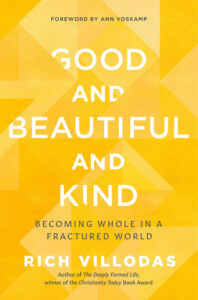 Good and Beautiful and Kind: Becoming Whole in a Fractured World Rich Villodas (Waterbrook) $24.00 OUR SALE PRICE = $19.20
Good and Beautiful and Kind: Becoming Whole in a Fractured World Rich Villodas (Waterbrook) $24.00 OUR SALE PRICE = $19.20
I am not overstating this, I sincerely say, when I suggest this is one of the handful of excellent books in this genre that will be talked about for years to come. I don’t know what is happening in the broader evangelical world but as some move into right wing weirdness and ugly politics (and others deconstruct and throw out too much of basic Christian thinking) we are finding a new generation of upbeat and honest, conversational but substantive, pastoral and prophetic writers like Villodas who bring a Christ-centered, gospel-oriented whole life discipleship that helps people really change, really grown, really learn the ways of God’s upside down Kingdom. Rich is a pastor of a large church in Queens, New York and is kind and caring — you can tell from the stories about his faith community and family and such — and yet has done his intellectual homework. He is widely-read and yet there is no haughty, name dropping of fancy theologians to impress. No — as I kept a finger in the back footnotes section, flipping back and forth with delight, I realized he was truly integrating important thinkers and using the poetic phrasing from fine writers to enhance his guidance into what the book promises: learning to experience a life of calm presence within this divided, anxious culture.
But this new book is more than a guide to finding a serene spirit or even about being more gracious in our divided times. It lives up to its title exploring the way towards goodness and beauty and kindness. They are described wonderfully, we are invited into their virtue, and the interconnections are explored.
Why good and beautiful and kind? (Well, who doesn’t want that, eh?) Actually, the three-fold phrase comes from a poem by Langston Hughes called “Tired.”
Kudos to you if you knew that or connected those dots! How good to have an evangelical pastor exegeting Langston Hughes.
I’ll share one of my own formational poets, singer-songwriter Shawn Colvin, who in “Summer Dress” sings,
I’m gonna go where the lights are bright
Where sacred secrets sail like kites
We’ve been sleeping, girl, all our lives
And we never lived we just survived
We never lived we just survived
I think these days there are many of us who are going through the motions, wishing for a place where “sacred secrets sail like kites,” where we do more than just survive. We are trying to be glad that we may be seeing — maybe! — the beginning of a slow down to the pandemic, we’re trying to be glad that maybe the leaders behind the January 6th insurrection will be taken to task and that we will find a way to rebuild within this cultural moment with something like grace and goodness and beauty. Harlem Renaissance poet Langston Hughes worried that we needed to cut hard into our culture to see what was wrong, why we were tired waiting for a culture of kindness. Shawn Colvin names this brave journey towards beauty and hope in this song as stepping into the wilderness.
Villodas gets this. I was in tears reading the first chapters on how we simply must grapple with the problems, the sadnesses, the injustices, the sin of the world. In the Langston Hughes poem he conjures all of this by calling us to “cut” and discover “worms.” Villodas almost playfully — he is never dour, even when serious — explores the worms of our lives. He’s sensitive to how unchurched friends are reading along, I’m sure, but let’s face it here: he’s talking about a doctrine of sin, and it is incredibly honest and true and freeing. He calls it “the fracturing of reality.” The first chapter there is on “a failure to love.”
There is in this book on kindness and goodness a second opening chapter that I really appreciated. It is on the notion of the “principalities and powers” which is a woefully under-appreciated New Testament key to understanding Christ’s victory. He draws on Walter Wink (as David Dark recently commended to us via twitter, by the way) and looks at both the personal influence of the dark forces around us and reminds us of the socio-political/cultural ways idols and evil spirits can pervade our lives. He quotes Berkhof, for crying out loud, and our old friend Marva Dawn. Thanks be to God!
And he realizes this leads to cultural disruptions and personal traumas. His insight comes from a deep study on his part into the scholars of trauma these days (including, obviously, Dr. Bessel Van Der Kolk and his must-read The Body Keeps the Score and Sheila Wise Rowe and her book Healing Racial Trauma) and others as well. This chapter is called “Hindering the Wound, Holy Wounds.” He puts together “trauma and the hope of the world” as nicely as anyone writing on this.
Having helped us understand (and not underestimate) the “forces behind the fractures” Pastor Rich guides us through the second central portion of Good and Beautiful and Kind by way of the call to “walking a better way.” This is poetic and mature and thoughtful and interesting. And, importantly, it is helpful. You will be reminded of the problem of prayer and how to be a “contemplative in a thoughtless age.” You will learn about the walls of the false self as he invites us to “humility and lowering our defenses” as one chapter puts it. There are good words on the page and important ideas in the air. Good and Beautiful and Kind is terrific.
Villodas’s guidance on resisting reactivity (that is, the cultivating the virtue of humility and learning to lower the dial on our defenses) is so rich, thoughtful and, again, useful with plenty of take-away points. Again, he draws on exceptionally good sources and writes so nicely without any pretense or heavy tedium to slog through. This is how a book of “basic Christian growth” can be done and done well.
Best-selling author and guide Ann Voskamp offers in her wonderful forward (where she says the author “speaks the dialect of Jesus”) this advice:
As you read these compelling words, keep a pen in hand and then write down your own words, in the margins, in a journal, because these pages are drawing a pathway to the good, the beautiful, the kind. You will want to trace the way, engage it, listen to the Holy Spirit beckoning and convicting and moving. And you will need to leave your own ink tracks to the good and the beautiful and the kind that you are seeking. Read with attentiveness because attentiveness is the beginning of receptiveness. And this is a book that you fully want to receive — these words will profoundly reorient.
I am still pondering the third portion of Good and Beautiful and Kind about being “a bridge not a barrier” as we pursue wholeness even in health conflict. This leans naturally to the “gift of forgiveness” and breaking the cycle of offense as he puts it. Can we love in public? Justice and action for public justice is part of the way of following Jesus so even in this lovely book about Christian growth in the ways of kindness, he knows he must help us “go public” with our faith and with our love for those who are particularly marginalized or hurting. From Howard Thurman to Fleming Rutledge, from James Cone to Scott McKnight, Pastor Rich invites us to a fuller life, a deeply Christian life. Not just walking in the wilderness — just surviving, but flourishing with goodness and beauty and kindness, forging a life with a redemptive kind of wholeness.
Good and Beautiful and Kind is a peaceful, gracious, and wise formulation of what it looks like to follow Jesus in a world ripping apart by a lack of love, by systemic powers, and by our own woundedness. Give yourself a retreat to spend time with this beautiful book. — Rev. Canon Dr. Scot McKnight, professor of New Testament at Northern Seminary, author of A Church Called Tov: Forming a Goodness Culture That Resists Abuses of Power and Promotes Healing
It’s not a secret that we are living in difficult and fractured times. Such times can be reasons for not just helplessness but more dangerously, hopelessness. Thankfully, there are servant leaders like Pastor Rich Villodas who don’t pretend to have all the answers and yet are not afraid to invite us to walk ‘a better way. — Rev. Eugene Cho, President and CEO of Bread for the World, author of Thou Shalt Not Be a Jerk: A Christian’s Guide to Engaging Politics
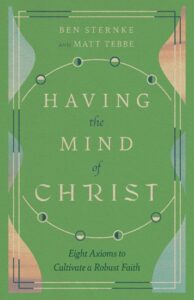 Having the Mind of Christ: Eight Axioms to Cultivate a Robust Faith Ben Stern and Matt Tebbe (IVP) $18.00 OUR SALE PRICE = $14.40
Having the Mind of Christ: Eight Axioms to Cultivate a Robust Faith Ben Stern and Matt Tebbe (IVP) $18.00 OUR SALE PRICE = $14.40
I would wax exponent about this new one but I will refrain — just trust me that this is one of the best books of this kind I’ve seen in a long while. Tebbe and Sternke are both pastors (connected with Missio Alliance) and serving as coaches in the “Gravity Leadership” group. They have a heart for visionary and missional outreach and they yet want to help equip people with guidance for real honest to goodness change and growth and spiritual maturity.
You may know that we see about four zillion books like this every month (okay, I exaggerate a little) and some are quite good. Many are helpful and the styles run from upbeat and cheery to dreadfully serious, from intense to almost goofy. Most are just okay. To each their own, so sure. Go get ‘em.
This new one, though, shocked me at how wise and insightful and compelling and good it seemed. Firstly, I like the title since having the mind of Christ is an overlooked feature of many handbooks for Christian growth. However, it is not a book I’d necessarily put in our “Christian mind” section as it isn’t primarily about thinking well, taking ideas seriously, or anything about worldviews, philosophy, or learning. So the topic of the title is broadly used but not by dismissing the life of the mind. It just isn’t primarily about that. I love those rare books that are thoughtful but not academic, about ordinary Christian formation but including the life of the intellect. They insist God cares about all of life and redemption includes all of our human-ness (God cares about it even more than we do is one of their axioms, in fact.) Right on!
Which leads me to another surprise. For understandable reasons for those who know this sort of literature coming out of the deeper end of the evangelical gene pool, I naturally thought this was going to be a Dallas Willard re-do. Which would be fine; from Jim Wilder to John Ortberg to some of Ruth Haley Barton, to a book called Seeking God coming soon from NavPress by Trevor Hudson relating St. Ignatius and Dallas Willard) we know some of our finest guides to our Christian lives are influenced by Dallas. His book Renovation of the Heart (I announced the 20th anniversary hardback a half a year ago) is a classic in evangelical spiritual formation and shows how inner transformation actually happens. All of Willard’s books are important (many adore The Divine Conspiracy parts one and two although I tout Spirit of the Disciplines as essential after Renovation.) I am sorry to digress because Tebbe and Sternke are not mostly re-gifting the good gifts of Willard. They cite him but in fresh ways and offer new hope even to the disenchanted.
I love the back cover recommendation by Rich Villodas, who writes:
The work of formation into the image of Christ entails new practices, but unless the deeper assumptions we hold about God are addressed, we will be rich in practices but poor in transformation. It’s for this reason that I’m grateful this book exists. Ben Sternke and Matt Tebbe have done a remarkable job excavating some of the most important questions, mindsets, and beliefs that get in the way of new life in Christ. This book is a great gift to the church.
I could tell you so much more about these axioms and why I think this is a very important book for our time. I’ll say just two things:
Firstly, they take very seriously that assumption that God is love and that love is the glue that holds the universe together. “It’s all about love” is axiomatic, but we need to hear over and over. Oddly, while serious theologians write in deep language about this truest truth, not as many basic Christian books in this genre draw on it as fully as they ought. These guys do. The first chapter is worth the price of the book.
Secondly, although I’d pitch this to almost anyone of any faith tradition, young or old, happy in faith or frustrated, sitting on the left or right side of the pew, it does seem to be written most keenly out of the authors’ own disillusionment with the pat answers of their evangelical background and with particular sensitivity to what those who use the word “deconstruction” mean by that these days. That is, if you wonder why the Christian life doesn’t seem to be adding up, if it doesn’t work as you thought it would, then this book is for you. One of their axioms is “God Meets Us In Our Messy Realty” which, although often said these days, isn’t teased out as these guys do for us.
Okay, a third quick observation — they quote some amazing writers, surely making this an artful, good read. The first footnote is from Anais Nin, maybe a first int this publisher’s history, I don’t know. I appreciated their wide reading and somewhat edgy engagement with contemporary theologians, thinkers, memoirists, scientists, and philosophers.
Listen to these two endorsements by people I trust and you will see why this book is so valuable.
Too often contemporary Western Christianity undermines its own claims of love and good news. Having the Mind of Christ acknowledges the inconsistencies and presses in with a deep longing for integrity, bringing healing as it goes. This book provides language and companionship for those doing the hard work of reimagining a way forward for the church of the twenty-first century, helping us recover from (and repent of) abusive faith practices, restoring us to the life-giving way of Jesus. — Mandy Smith, pastor and author of The Vulnerable Pastor and The Unfettered Life.
Perhaps we are faithful Christians who have tried Christianity and found it wanting. But what if we were given the wrong lenses with which to view God, the gospel, and life? What if our spiritual eyesight is off? Ben Sternke and Matt Tebbe function as eye doctors offering eight axioms, not formulas, by which to live. These serve as corrective lenses that guide us toward honest and more intimate communion with God and embodiment of the gospel. This book is personal, crystal clear, and especially needed for those of us who long for more, to know and be known by God, and to be disciples of Jesus. — Marlena Graves, author of the Way Up Is Down: Becoming Yourself by Forgetting Yourself
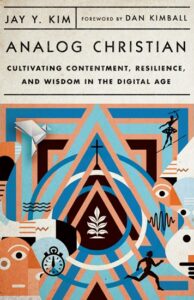 Analog Christian: Cultivating Contentment, Resilience, and Wisdom in the Digital Age Jay Y. Kim (IVP) $17.00 OUR SALE PRICE = $13.60
Analog Christian: Cultivating Contentment, Resilience, and Wisdom in the Digital Age Jay Y. Kim (IVP) $17.00 OUR SALE PRICE = $13.60
I don’t know about you but I’m starting to grow just a little weary of books that are about something or another “in the digital age.” There are so many good books on this, from Sherry Turkle’s Alone Together and the must-read, wonderfully-written meditation The Life We’re Looking For by Andy Crouch to the recent academic ones like Restless Devices: Recovering Personhood, Presence, and Place in the Digital Age and Digital Communion: Marshall McLuhan’s Spiritual Vision for a Virtual Age. A recent book from Fortress Press by Ryan Panzer is called Grace and Gigabytes: Being Church in a Tech-Shaped Culture which, like, say, the quick reader, Becoming A Hybrid Church (by Dave Daubert and Richard Jorgensen) is very helpful as congregations continue to serve those playing in safe in this not-yet-quite post-Covid era.
But this one, Analog Christian is one I’ve been eagerly waiting for. It is not jumping on a bandwagon: the dude is a tech guy who left the industry to plant a church in Silicon Valley. I’m not kidding — he knows his stuff and I loved his excellent Analog Church which, perhaps ironically, I reviewed right before the pandemic in March of 2020 kept us all at home until we figured out live streaming worship and Zoom Bible studies. Analogue Church was not an anti-technology screed, of course, but insisted on (in normal circumstances) an embodied presence.
Analog Christian is a natural follow up to Analogue Church but, given our more prevalent enmeshment on digital platforms, now more than ever before, reflecting on discipleship in the digital age sure is needed. This is not cheap or cheesy, not just jumping on the hot topic of the year. I am confident this is one of the best books of this sort this year.
Kim notes that “the digital age is in the business of commodifying our attention.”
The back cover explains:
The technologies of our day are determined to keep us scrolling and swiping at all costs, plugged into a feedback loop of impatience, comparison, outrage, and contempt. Blind to the dangers, we enjoy its temporary pleasures, unaware of the damage to our souls.
So how do we live before God’s face and involved with others, deepening our character and Christ-likeness in ways that enhance our “contentment, resilience, and wisdom”? This book shows how.
Brilliant gospel futurecaster Leonard Sweet — who has become a tad more critical of technology in recent decades, it seems (see his marvelous little book called From Tablet to Tables) suggests that this good volume is also helpful for parents as their kids grow up in this digital world. He colorfully writes,
Jay Y. Kim is an ecclesiastical alchemist who shows us how to turn information into knowledge, knowledge into wisdom, and wisdom into truth. Analog Christian is a book no parent can afford to miss .— Leonard Sweet, author, Rings of Fire: Walking in Faith Through a Volcanic Future
And, wow, listen to this from trustworthy Bible prof and eco-ethicist A.J. Swoboda
I can’t express the inner jubilee I am having that this book is finally here. What a marvelous invitation to the primal Christian movement that is solely and singularly focused on Jesus as Lord of all in our fragmented and distracted moment. Analog Christian gives voice to a part of all of us that longs for a day when Christians are known for their fruit over their fame. This work will set Jay Kim up as an enduring voice for the church for this generation. Highly recommended. A must-read. —A. J. Swoboda, author, After Doubt: How to Question Your Faith Without Losing It
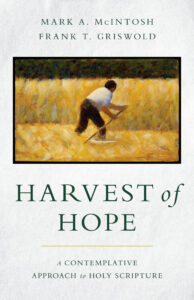 Harvest of Hope: A Contemplative Approach to Holy Scripture Mark A. McIntosh & Frank Griswold (Eerdmans) $22.99 OUR SALE PRICE = $18.39
Harvest of Hope: A Contemplative Approach to Holy Scripture Mark A. McIntosh & Frank Griswold (Eerdmans) $22.99 OUR SALE PRICE = $18.39
Seeds of Faith: Theology and Spirituality at the Heart of Christian Belief Mark A. McIntosh & Frank Griswold (Eerdmans) $22.99 OUR SALE PRICE = $18.39
These two books are just lovely companion volumes and look so good side by side. I’m not sure which to recommend more energetically or which to suggest that you read first. Both are just really fine, elegant reflections that invite you to mature rumination on spiritual practices that will enhance your Christian living in this world.
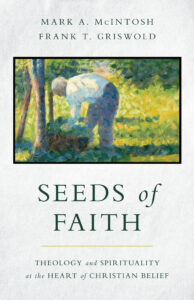 You may know that Frank Griswold is a retired Episcopal priest who was the former Presiding Bishop of that whole denomination. (He is also the father of Pulitzer Prize winning writer Eliza Griswold, who gets her curiosity, wonder, sense of justice and good writing chops honestly.) Mr. McIntosh is an Episcopal priest and theologian who died just last year as these books were at the publisher. He was the inaugural holder of Loyola University Chicago’s endowed chair in Christian spirituality. He served previously Professor of Divinity at Durham University and canon residentiary of Durham Cathedral, UK. McIntosh was the author or editor of several academic books on the interrelationship of theology and spirituality and a lovely one on Cowley Brothers publishing on Anglican spirituality.
You may know that Frank Griswold is a retired Episcopal priest who was the former Presiding Bishop of that whole denomination. (He is also the father of Pulitzer Prize winning writer Eliza Griswold, who gets her curiosity, wonder, sense of justice and good writing chops honestly.) Mr. McIntosh is an Episcopal priest and theologian who died just last year as these books were at the publisher. He was the inaugural holder of Loyola University Chicago’s endowed chair in Christian spirituality. He served previously Professor of Divinity at Durham University and canon residentiary of Durham Cathedral, UK. McIntosh was the author or editor of several academic books on the interrelationship of theology and spirituality and a lovely one on Cowley Brothers publishing on Anglican spirituality.
I love how the publisher describes the first one as “an immersive introduction to the Christian faith that illuminates essential doctrines and propels readers beyond abstract knowledge to experience the living mystery who is God.” If you are the sort that reads a bit in mysticism and contemplative sorts of spirituality, it might be good for you to read this, which I assure you that you will enjoy, as it grounds your experience in doctrine and theology. More so, if you are a theology buff, this will wisely, as that quote above said, point you beyond the ideas to the encounter with God. Nice
And, yes, the one on Scripture pretty much does the same thing, using the Bible as a resource for deepening our spirituality and finding, beyond and through the printed page, an experience of God’s own Spirit. The publisher introduces it as not only a guide to the texts of the church year and the liturgical calendar, but a handbook on “praying the Scriptures, integrating theology and spirituality and Bible study.
As they say, “When we read Scripture, we learn about God. When we pray the Scriptures, we experience the mystery of Jesus Christ and inhabit his life.”
Drawing on scripture texts from the cycle of the church year, McIntosh and Griswold usher readers into their own interior process of lucid theological reflection woven into prayerful encounters with the Word. Here the disastrous rift that opened up between theology and spirituality in the Western church a millennium ago is healed. Reading this compelling and beautiful book is a grace in itself. — Julia Gatta, Professor of Pastoral Theology at Sewanee: The University of the South and author of Life in Christ: Practicing Christian Spirituality
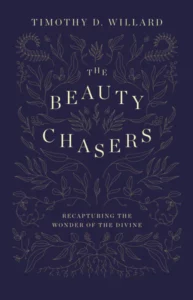 The Beauty Chasers: Recapturing the Wonder of the Divine Timothy D. Willard (Zondervan) $22.99 OUR SALE PRICE = $18.39
The Beauty Chasers: Recapturing the Wonder of the Divine Timothy D. Willard (Zondervan) $22.99 OUR SALE PRICE = $18.39
I am glad that there are many books out these days for non-specialists on the arts, on what we might call appreciating the aesthetic dimension to life, as Calvin Seerveld taught in his seminal and glorious Rainbows for the Fallen World. We’ve seen in the last year several extraordinary books about how a sense of beauty —not so much art, proper, but an appreciation of the luminous and the awesome and the lovely — can enhance our lives, even our spiritual lives and Christian discipleship. Sarah Clarkson’s wonderful This Beautiful Truth: How God’s Goodness Breaks Into Our Darkness was one of our “Best Books” of last year in part because of how she invited us to beauty in times of hardship. Believe me, many of us needed that.
This new one is by an old acquaintance, a young performing artist turned theologian (with a fancy degree from Oxford where he lived for a few years exploring “northern aesthetics” in the works of C.S.Lewis.) He has written several books with his pal Jason Lucy, including Veneer: Living Deeply in a Surface Society (which has quite a following and has won some awards) and a terribly under-appreciated, really good hardback called Home Beyond the Sun: Connect with God in the Brilliance of the Everyday which we continue to carry in great hope that it will be discovered.)
This brand new one — which the aforementioned Sarah Clarkson calls a “radiant invitation” — is the culmination of much of his recent work and scholarship, make accessible and lively for anyone needing a push into the “brilliance of the everyday.” God can speak through beauty, even though we have often reduced our sense of artful listening to watching TV or be taken up with empty amusement. As he puts it, “We treat beauty as a novelty while despair crouches near. Or we believe it is only for the elite of society — professors, art critics, pop stars.”
I am not enamored with the notion of “chasing” beauty but Tim does not overstate our role in discovering wonder and beauty. Perhaps it might also be described as a posture of attentive reception. Be open and eager. Maybe you don’t mind the title, but if you do, don’t let it keep you from it.
Here is how they put it on the back cover:
Beauty Chasers are thinkers and listeners. They see when the world goes blind. They embody quietness when all the world wants to do is scream. They give life to others when the world seems bent on destruction. Beauty Chasers live to a different cadence. They walk the path less traveled.
If you are interested in deepening your sense of and appreciation for these things, Tim Willard invites you to risk change. He’s a fun and energetic writer and he tells some fun stories. He has chapters about curiosity and “a place called love” under the section called “Something Stirring in the Deep.” We need love and goodness and beauty and glory — including a “beautify and terrible God.”
The next several chapters of The Beauty Chasers: Recapturing the Wonder of the Divine explore “holy wayfinding” and invites us to start participating in the “Footpaths of the Park.” Beauty takes our “reverent participation.” (Ohhh, I like that phrase!) The next unit of chapters are about the mystery of it all (“Footpaths of the Hills” he calls this section) and he has a lovely chapter called “the riches of seeing” which I loved. The next chapter is about making spaces beautiful.
The final four chapters are about “the life-giving mark of beauty” and Willard calls this section “Footpaths of Mountains.” This includes some teaching on spirituality, a reflection on meekness, and, yes, about joy. I haven’t gotten to this part yet, but I am sure it will be a huge encouragement and a good guide for many Hearts & Minds friends and BookNotes readers. As novelist and memoirist Sean Dietrich (“Sean of the South”) wrote, “If this book doesn’t light your fire, your wood is wet.” Ha. We are happy to recommend it to get your fire going.
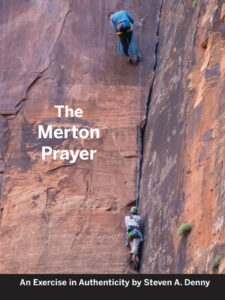 The Merton Prayer: An Exercise in Authenticity Steven A. Denny (ACTA) $19.95 OUR SALE PRICE = $15.96
The Merton Prayer: An Exercise in Authenticity Steven A. Denny (ACTA) $19.95 OUR SALE PRICE = $15.96
I have mentioned this before but it might have been missed as I was suggesting it on one of our BookNote newsletters about books to give to college graduates or maybe in one about deepening our capacities for spiritual discernment. It is such a fine and interesting and informative (and formative) book it fits here nicely on this list. It isn’t your typical Christian self help formulaic book and doesn’t offer jazzy talk about having more faith.
My friend Steven Denny is a former pastor and seminary prof who became a lawyer. Let’s just say he’s seen some stuff, experienced some ups and downs. At some point in his life rediscover the famous one-page chapter in Thomas Merton’s wonderful book Thoughts in Solitude that (you will remember if you’ve seen it) nothing but the prayer. Many know (or maybe have seen a Facebook meme) with a line from it, perhaps the part about not knowing where we are going or not seeing the road ahead. Or maybe the part about not knowing how to please God but how maybe the desire to so actually pleases God. The prayer is honest, searching, clear, and powerful. It changed Steven’s life.
This book looks at the often-cited prayer and, or so it seems to me, makes a valuable contribution to Merton studies because there isn’t anything like it. Merton fan or not, though, it is a tremendous resource to help you explore your own interior life, your motivations, your desires.
There are professional done photographs to enhance the book and a good section introducing the life and ministry of the Kentucky Trappist. Merton really was a fascinating figure (we have a lot of books by and about him) and you’ll love Mr. Denny’s overview. He wants you to know something about the young monk who wrote the prayer, and then he wants you to embrace it for yourself.
To do that, you learn a bit about Steven’s own journey and how he used and was transformed by this deceptively simple prayer.
As I noted in my earlier review the book not only includes the artful photos for visual imagery but six Scriptural studies that stood to the author. (He’s a former preacher, a teacher of New Testament Greek and a practicing trial attorney so he knows how to see connections and make a point.) Only such a guy would talk about “exegeting” Merton’s words and get away with it. But exegete them he does, helping us understand and more deeply appreciate their real meaning — as he puts it, “ask and keep on asking about, making your asking a matter of daily habitual behavior.” Keep turning the Rabbi’s used to say. He even has discussion questions to help you process this or even use it in a small group of trusted friends on the journey.
As artful, spiritual formation writer Judith Valente puts it,
Steven Denny provides us with a long overdue exploration of The Merton Prayer, using a kind of lectio divina — a slow, contemplative, sacred reading — of each phrase. Remarkable.
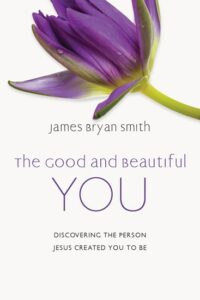 The Good and Beautiful You: Discovering the Person Jesus Created You To Be James Bryan Smith (IVP) $25.00 OUR SALE PRICE = $20.00
The Good and Beautiful You: Discovering the Person Jesus Created You To Be James Bryan Smith (IVP) $25.00 OUR SALE PRICE = $20.00
Oh my, are we glad for this! Unlike a number of books on this topic these days that are mostly remedial (shall we say) for those who need to clarity about a Biblical view of self esteem and God’s accepting mercy, offering a Christ-centered sense of identity — as important as they are — The Good and Beautiful You seems to me to be written not primarily as psychological or theological self help, but as foundational, keen and/or insightful every believer. This is very good stuff. I suggest it for anyone interested in a lively Christian approach to self and selfhood and for those wanting a slight dip in the waters of what could be transformational spirituality.
You see, this is the fourth in the series by James Bryan Smith known as the “Apprentice Series” and released in the always marvelous formatio line of IVP. The first three books in this series are all standards that we recommend when asked for books on spiritual growth — The Good and Beautiful God, The Good and Beautiful Life and The Good and Beautiful Community. Happily, we’ve got to stop calling them a trilogy!
This new one, like the other, is clearly and nicely written, drawing on the insights of Richard Foster and Dallas Willard and Eugene Peterson and other such clear-headed and down to Earth contemplatives. It may quote the poetry of Theresa of Avila or the mysticism of Thomas Merton or the good theology of Bonhoeffer but it offers the popular phrasing of Buechner or other contemporary, engaging stylists. I love books like this that are clearly substantive without being rigorously academic, that are thoughtful without being arcane, and, in this case, combine good psychology and good spirituality.
Each of these volumes have nearly a devotional tone and there are wonderfully-created exercises after each chapter. There are discussion questions, certainly making it ideal for a small group or class, but these experiences which are offered under the rubric of “Soul Training” pieces are a good way to get more out of the book, to live it. We highly recommend them all. Don’t miss this new one, The Good and Beautiful You about how you can “discover the person Jesus created you to be” — from the depths of your soul to the details of your sacred body! It is what one reviewer described as a “heart-piercing and mind-nurturing journey into redeemed personhood.”
With his signature combination of intellectual rigor, accessible language, and pastoral care, James Bryan Smith has helped thousands of us believe firmly in the goodness and beauty of God. But what are we to believe about ourselves? How do we fit into God’s good and beautiful universe? Merging solid teaching and carefully crafted soul-training exercises, The Good and Beautiful You firmly debunks the false narratives we believe about ourselves and replaces them with life-giving, soul-enriching truth. This book is a treasure. — Richella J. Parham, author of Mythical Me: Finding Freedom from Constant Comparison
THREE SOMEWHAT MORE RIGOROUS STUDIES FOR FOUNDATIONAL CHRISTIAN LIFE
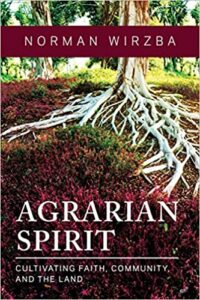 Agrarian Spirit: Cultivating Faith, Community, and the Land Norman Wirzba (University of Notre Dame Press) $29.00 OUR PRE-ORDER SALE PRICE = $23.20
Agrarian Spirit: Cultivating Faith, Community, and the Land Norman Wirzba (University of Notre Dame Press) $29.00 OUR PRE-ORDER SALE PRICE = $23.20
AVAILABLE TO BE PRE-ORDERED – DUE AUGUST 1, 2022
I hope you know the work of the remarkable Norman Wirzba who has written or co-written both lovely and accessible books like Making Peace with the Land and Living the Sabbath (both which offer joy and delight) and more academic studies such as one on the “phenomenology of prayer” and another “theology of eating” called Food and Faith and the recent, brilliant This Sacred Life that we touted early this spring. This soon-to-be-released forthcoming volume (due early August) is, curiously, a meaty work but yet very, very readable for educated readers. It is exceptionally thoughtful but not scholarly. He draws on insights of the sort made popular by his friend Wendell Berry and examines what it means to have an agrarian spirit. It is not, he explains, exactly what you may think.
Agrarianism is a certain movement that developed (popularized by Berry) in response to, among other dehumanizing and creation-damaging trends, big agriculture and the unstable placelessness of our upwardly mobile society. It focuses on place, on stability, or real skills and real care, standing even in rooted traditions.(He helpfully brings in some deep thoughts by Simone Weil, here.) Which is to say it is not primarily about being a farmer. As Wirzba explains, one can live in rural areas and be discontent and dislocated from the land; one can be a bad farmer. Similarly, perhaps counterintuitively, one can be an urban dweller with an agrarian spirit. It isn’t about where one lives, but how one lives.
As Grace Olmstead (author of Uprooted: Recovering the Legacy of the Places We’ve Left Behind) notes, it shows what means to be “interdependent and embodied.” Nice!
Further, the point of this remarkable book is that this sort of well-grounded lifestyle can evoke a certain sort of spirituality. Not a pie in the sky piety that despises creation, obviously, nor an exceedingly interior mysticism that focuses inward. I love this creation-based spirituality that strikes me as fully Biblical, rejecting the twine results of dualism, otherworldliness and privatization. I’m not sure if the Duke professor of theology and ethics — of an agrarian sort — who is Dutch thinks of the old theologian from Holland, Abraham Kuyper or not, but his spirituality seems to be what some might call (drawing on Al Wolters’ Creation Regained) reformational. This is a book attuned not only to Scripture and theology and a living, lively faith, but applies it’ll to contemporary needs given our politics, economics, and cultural disarray. He draws in insights from Biblical teacher and like-minded colleague Ellen Davis and an array of social scientists, ecologists, and philosophers I mostly did not know.
But here is the thing: after three tremendous, sophisticated chapters exploring “Agrarian Fundamentals” there are six long chapters of what Wirzba calls “Agrarian Spiritual Exercises.” I’m telling you, this tells about spiritual formation of the sort you won’t find in most discipleship programs or in typical spiritual direction groups. It is serious, provocative, unique, radical in the best sense. The discerning and always elegant writer Marilyn McIntyre calls it “lovely” and “surprising.”
These smart chapters include Learning to Pray, Learning to See, Learning Descent, Learning Humility, Learning Generosity, and Learning to Hope. I am very much eager to hear how people have received Agrarian Spirit and how we can, as the subtitle invites, become people who are committed to “cultivating faith, community, and the land.”
If ‘incarnate spirituality’ sounds like an oxymoron to you, let Norman Wirzba be your guide to the agrarian arts of faith. This book is the culmination of decades of thinking and writing and work, and there is no writer better equipped to articulate how an agrarian sensibility should shape our spiritual practices.” ―Jeffrey Bilbro, author of Reading the Times and editor-in-chief at Front Porch Republic
Agrarian Spirit isn’t luddite, nostalgic, or angry. Rather, it’s a gentle, wise, and hopeful call forward, casting a vision for how to live as God’s people in God’s world. I loved this book, and it flooded my imagination with pictures of what the Kingdom of Heaven could be, right now, right in my neighborhood.” ―Andrew Peterson, author of The God of the Garden
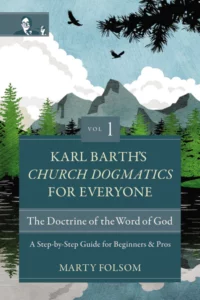 Karl Barth’s Church Dogmatics for Everyone: The Doctrine of the Word of God — A Step-by-Step Guide for Beginners & Pros Marty Folsom (Zondervan Academic) $29.99 OUR SALE PRICE = $23.99
Karl Barth’s Church Dogmatics for Everyone: The Doctrine of the Word of God — A Step-by-Step Guide for Beginners & Pros Marty Folsom (Zondervan Academic) $29.99 OUR SALE PRICE = $23.99
Wow, who knew such a book would ever be done? If you’ve ever pondered wanting to know anything about the serious work of Karl Barth, maybe something beyond the wonderfully interesting Barth for Armchair Theologians by John Franke, this, then, is what you’ve been waiting for. I’ve started and quickly bowed out of more Barth books and more books about Barth than I should admit. This is the one I’ve been waiting for.
This reader-friendly and upbeat and cleverly designed study of the great German Neo-orthodox thinker is the first in what will be an ongoing series exploring his multi-volume Church Dogmatics.(The second, on the Doctrine of God, will release Spring of 2023.) The Barth volumes are notoriously dense and expensive (and not numbered very sensibly, if you ask me.) So we need all the help we can get.
This paperback is pushing up towards 300 pages but the print is a nice size and there are sidebars and pull quotes and illuminating charts and good discussion questions; it is really nicely arranged. There are introductory points and summary sections.
Not only is this a serious but readable study of “The Doctrine of the Word of God” portion of Dogmatics (incredibly important in both the history of modern theology and for Barth’s overall project) but along with the insight of Marty Folsom (our “tour guide”) other authors show up for small bits. I love the way they have reflections by scholars or leaders saying why all this matters for them.
For instance, we have Douglas Campbell saying why those in Biblical studies might care about all this; Myk Haters does the same as a systematic theologian. We’ve got a pastor, a mental health professional, a director in spiritual formation and a scientist. Calvin scholar Julie Canlis offers a lovely piece on why Barth mattes to ordinary people. Nice!
The author, Dr. Marty Folson, is a colorful New Zealander, theology prof unlike most, it seems, and is a very fine writer, too. Here is a quote (by Kerry Dearborn, author of Drinking from the Wells of New Creation) describing his good style, taken from the back of a previous book, Face to Face. We’re excited about Karl Barth’s Church Dogmatics for Everyone: The Doctrine of the Word of God — A Step-by-Step Guide for Beginners & Pros
With lyrical clarity and deep insight, Marty Folsom invites us to live into the rich mystery of the interrelatedness of all of life — life that flows from, and is sustained by, the Triune God, whose very being is self-giving love.
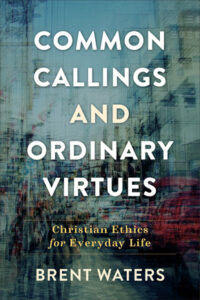 Common Callings and Ordinary Virtues: Christian Ethics for Everyday Life Brent Waters (Baker Academic) $27.99 OUR SALE PRICE = $22.39
Common Callings and Ordinary Virtues: Christian Ethics for Everyday Life Brent Waters (Baker Academic) $27.99 OUR SALE PRICE = $22.39
Just the other day I had the chance to again tell a customer about how much I appreciate the new compilation of teachings about all sorts of ethics from the years of classroom teaching by David Gushee, Introducing Christian Ethics: Core Convictions for Christians Today. An honest ex-evangelical and “still Christian” (as his memoir puts it) Dr. Gushee has emerged as a major voice of a certain sort of moderate/progressive, consistent life scholar and activist.
And then I told him about this one, the new, breathtaking volume by leading ethicists Brent Waters which “offers a theological guide to thinking Christianly about the ordinary nature of every day life.” It may be a one of a kind study. What a book!
I’m not sure where to put this book in our store and I look forward to working through it myself, soon. It isn’t simple and it isn’t simplistic (if you catch my difference.) It admits to much nuance and it is, as Robert Song of Durham University puts it, “richly pondered.” As Sondra Wheeler of Wesley Theological Seminary describes it, it is “a lucid and theologically rich account of the centrality and power of the ordinary in moral life as Christians understand it.” Where do we shelve books about the centrality of the ordinary for the morally serious reader? In Water’s view, our mundane moments are formative and can shape us to be more Christ-like.This is, I’d say, a book about basic Christian growth.
There is profound reflection here on creation, incarnation, and resurrection, on virtue and vice, or “rituals and the ordering of time and place.” These profound ruminations lead to explorations on neighbors, friends, spouses, children, strangers, citizens and the like.
The final section looks at any number of truly ordinary aspects of life — work (including housework and homework), manners, appearance, eating and leisure. There’s even a bit on “the good of being boring.”
Once again Baker Academic has given us a treasure, a book not just for academics but for all of us.
Listen to Gilbert Meilaender, the exceptionally thoughtful Lutheran ethicist from Valparaiso University, who writes:
I hope Waters will take no offense when I say that this book could not have been written by a young man. Wide-ranging in the topics it takes up, the fruit of much reading and much living, simultaneously respectful and politically incorrect — it cannot fail to provoke thought about the shape of a life well lived.
++++
Like Meilaender’s promise that the Brent Waters book will “provoke thought about the shape of a life well lived,” I think all of these books will help with that and, further, will help you not just think about life, but live it. Well. These books are gifts, guides, tools. Order some today.
TO PLACE AN ORDER
PLEASE READ AND THEN CLICK ON THE “ORDER HERE” LINK BELOW.
It is helpful if you would tell us how you prefer us to ship your orders. The weight and destination of your package varies but you can use this as a general guide.
There are generally two kinds of US Mail options, and, of course, UPS. If necessary, we can do overnight and other expedited methods, too. Just ask.
- United States Postal Service has the option called “Media Mail” which is cheapest but can be slow. For one typical book, usually, it’s about $3.50.
- United States Postal Service has another option called “Priority Mail” which is $8.35 if it fits in a flat rate envelope. Many children’s books and some Bibles are oversized so that might take the next size up which is $8.95. “Priority Mail” gets much more attention than does “Media Mail” and is often just a few days to anywhere in the US.
- UPS Ground is reliable but varies by weight and distance and may take longer than USPS. We’re happy to figure out your options for you once we know what you want.
If you just want to say “cheapest” that is fine. If you are eager and don’t want the slowest method, do say so. It really helps us serve you well.
– DON’T FORGET TO LET US KNOW WHAT SHIPPING METHOD YOU PREFER –
BookNotes
SPECIAL
DISCOUNT
20% OFF
ALL BOOKS MENTIONED
+++
order here
this takes you to the secure Hearts & Minds order form page
just tell us what you want to order
inquire here
if you have questions or need more information
just ask us what you want to know
Hearts & Minds 234 East Main Street Dallastown PA 17313
read@heartsandmindsbooks.com
717-246-3333
It is complicated for us, but we are still closed for in-store browsing due to our commitment to public health (not to mention the safety of our staff and customers.) The vaccination rate here in York County is sadly lower than average and the new variant is now spreading. Our store is a bit cramped without top-notch ventilation so we are trying to be wise and faithful.
Please, wherever you are, do your best to be sensitive to those who are most at risk. Many of our friends, neighbors, co-workers, congregants, and family members may need to be protected since more than half of Americans (it seems) have medical reasons to worry about longer hazards from even seemingly mild Covid infections.
We are doing our famous curb-side customer service and can show any number of items to you if you call us from our back parking lot. We are eager to serve and grateful for your patience as we all work to mitigate the pandemic.
Of course, we’re happy to ship books anywhere. Just tell us how you want them sent.
We are here 10:00 – 6:00 EST / Monday – Saturday, closed on Sunday.

